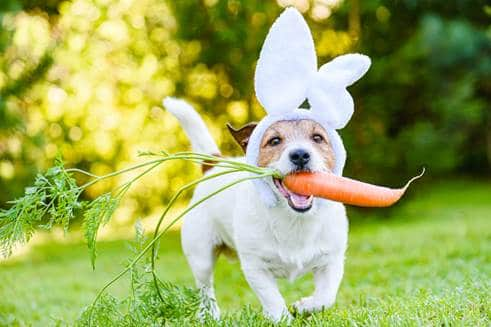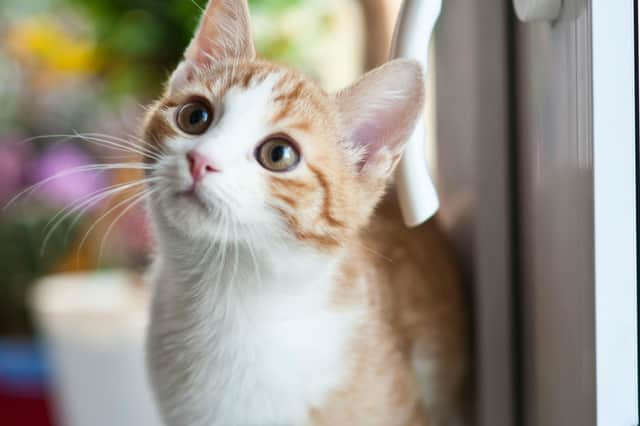I'm a vet and I recommend not feeding these treats to your pets over the Easter holidays
This article contains affiliate links. We may earn a small commission on items purchased through this article, but that does not affect our editorial judgement.
and live on Freeview channel 276
As we approach the Easter weekend, households across the UK will be full of hot cross buns, flowers and Easter eggs.
Vets have issued a stark warning to pet owners during this time that hot cross buns are actually toxic to your pets and left-over roast dinner can cause tummy issues.


Advertisement
Hide AdAdvertisement
Hide AdAccording to pet insurance data, chocolate poisoning in dogs increases by a huge 123 per cent over Easter, but many other unknown Easter treats can be toxic to dogs and cats.
From lilies to hot cross buns, pet experts at TrustedHousesitters have spoken to vets to determine the biggest risks to our furry friends. Here are six things all pet owners should steer clear of:
Hot cross buns
The popular Easter hot cross buns contain ingredients that are toxic to dogs, such as raisins, currants, and spices.


Nutmeg, which is prominent in many hot-cross buns, contains a toxin called myristicin, which can cause stomach issues if ingested.
Advertisement
Hide AdAdvertisement
Hide AdIf consumed in large amounts, nutmeg may cause more severe symptoms such as increased heart rate, disorientation, abdominal pain, hallucinations and even seizures.
Roast dinner leftovers
While dinner leftovers may seem harmless, too much could spell danger.
Vet Rebecca MacMillan (BVetMed) warns: "A sudden change in diet could lead to mild tummy troubles like vomiting or diarrhoea, but, in some cases, a serious episode of painful pancreatitis (inflammation of the pancreas) could be triggered.
"Affected animals could require hospitalisation for support and treatment. Fatty foods are particularly to blame in susceptible individuals, so make sure you don't offer your pet meat rinds or any drippings/grease."
Advertisement
Hide AdAdvertisement
Hide AdBe careful to dispose of bones from your meat joint safely, as pets getting hold of them could mean a stressful and costly emergency pet visit.
Lillies
They may be stunning to look at, but lilies are a definite no-no for anyone with a pet. When sending flowers at Easter or any other special occasion, always check whether the recipient has pets and instruct florists to avoid lilies and other toxic flowers.
Certified vet Amanda Takiguchi, DVM, said: "A common flower that veterinarians warn cat owners against is lilies.
"Even eating a small amount of this flower can cause deadly kidney failure in cats. Multiple species of lilies are toxic, so it's best to avoid lilies altogether."
Advertisement
Hide AdAdvertisement
Hide AdREAD MORE: I was beaten by my mum when I told her I was transgender but now I'm finally living life as me!
Join our new WhatsApp Community to get the latest news and top stories from across Lancashire directly to your phone. Sign up for our free newsletters now Xylitol artificial sweetener
While most pet owners are aware of the risks of chocolate, another dangerous sweet treat to look out for is xylitol, an artificial sweetener often found in sugar-free Easter treats and cakes.
In dogs, xylitol can cause them to release large amounts of insulin, leading to a rapid drop in blood sugar. If their blood sugar drops too low, severe hypoglycemia can occur, which causes symptoms like vomiting, weakness, collapse, seizures, and even death.
Easter decorations
Advertisement
Hide AdAdvertisement
Hide AdEaster decorations are becoming more popular – but they could pose a risk to pets.
Curious cats and dogs could put themselves in danger by chewing or even accidentally eating these decorations.


Daffodils
Daffodils are a popular Easter flower and start flowering in March-April. However, this plant is extremely poisonous for many pets, including cats and dogs.
Your canine or feline friend will experience severe vomiting and health concerns if they ingest any part of a daffodil, but the bulb is particularly poisonous because it contains toxic alkaloids and glycosides.
Comment Guidelines
National World encourages reader discussion on our stories. User feedback, insights and back-and-forth exchanges add a rich layer of context to reporting. Please review our Community Guidelines before commenting.